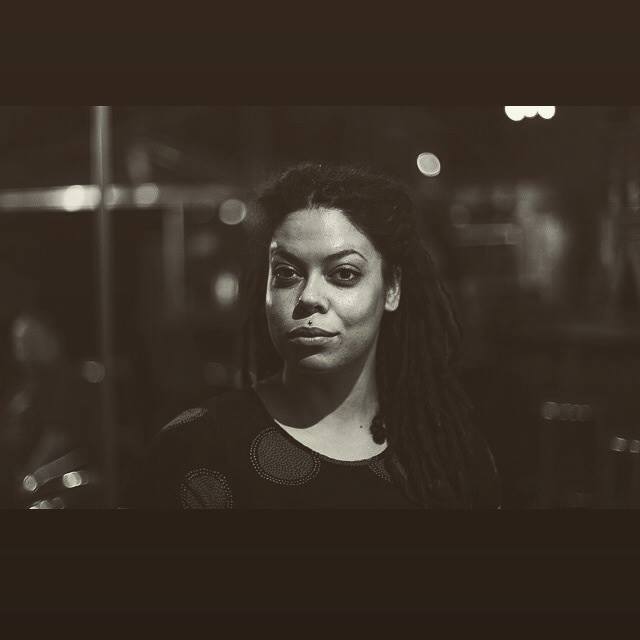Joy Priest is a writer from Louisville, KY., studying in the MFA program at the University of South Carolina. She has received grants, fellowships, and scholarships from the Bread Loaf Writers’ Conference, the Kentucky Arts Council, and the Fine Arts Work Center in Provincetown, MA. Priest is a two-time finalist for the International Poetry Awards’ Rita Dove Poetry Prize from the Center for Women Writers. Her work can be found in pluck! The Journal ofAffrilachianArts & Culture, Drunken Boat, Muzzle, Vinyl, Callaloo, Best New Poets 2014, and TheBreakBeatPoets: New American Poetry in the Age of Hip Hop. She won for a collection titled Elegy for Kentucky.
Q&A
Who are the poets who inspire you?
The list of poets who inspire me is extensive. I read widely every day, and nearly every day I am introduced to a new poet with whom I’m delighted—very recently: Korey Williams out of Cornell, who was just a semi-finalist for Narrative’s annual poetry prize, and Donika Kelly, who was just long-listed for the National Book Award. However, I would say the major influences for me are Olds, Trethewey, Finney, Hayes, Rukeyser, and Faizullah: Sharon Olds for her gall and subject matter; Natasha Trethewey for her subject matter and restraint; Nikky Finney for her precision and poet values; Terrance Hayes for his masterful discursiveness and invention; Muriel Rukeyser for our shared background in journalism and obsession with reporting; and Tarfia Faizullah for her spirit, her eye, her line, her blood on the page.
These poets are always with me when I’m writing, or, rather, these poets are who I go to when I’m trying to find my way into a poem. I find reading poetry is what ultimately gets me into the writing of poetry.
Did any of them influence you in your writing of “Elegy for Kentucky”?
When I wrote “Elegy for Kentucky,” I’d been thinking about it for about six or seven months—the horse in the poem. Vievee Francis’ Forest Primeval had been tucked into the back of my pants for that long. I had memorized 100 Bells by Faizullah and was reciting it to myself daily. Then I read the part in The Iliad about Achilles’ horses weeping. The horses wept. It was everything to me.
I knew, then, what to do with the horse, or, rather, what the horse was doing. But I said to myself, or some voice said to me: “You can’t write mythological references or literary iconography into a poem, you don’t know anything about that.” This trepidation is important for me to admit in public. Coming out of an inner-city high school with a student body that was 93% African American, and disenfranchised, I didn’t get a formal education on the classics. I wasn’t an English major in college; I studied journalism. Nevertheless, it is very important for me to take these canonic conventions and classic forms, and disrupt them. So, I was determined. Of course the poet I went to for mythology in this way was Natalie Diaz. Of course. I mean, Diaz really put that clinic on for me. And then Ada Limon—my fellow Kentuckian and lady thoroughbred enthusiast—had to be called.
Interview conducted by Priscilla Lalisse-Jespersen, October 2016
Elegy for Kentucky
By Joy Priest
To renounce, reject, disown, desert, forsake, or to quit a place, it has to have wounded you the way a person can
—Anna Journey, “A Flicker of Animal, a Flank”
What the heart wants? The heart wants / her horses back
—Ada Limon
Nowhere to drive, night upon night
that last summer, but back
to the cokey couple I was crashing
with in their 26-year habit. On the
way there the same horse always
dying at the curve as I turned, like
a kitschy disco ball, onto their
street, name I can’t recall.
There she lay toppled like a toy figurine.
Calm but huffing, a laboring machine
making steam, though the cold air
belonged to June, its grief. A filly
done before becoming a mother, great belly
black & wide as all surrender
& that magnificent face still against the grass
waiting for the end. There she was every time
whispering something to me, a line
throbbing, a visible heartbeat I watched
in the mirror for hours with huge horse eyes.
I needed to see it, to make sure
it was still there. I went the same way each evening
wanting to feel something, to see
this once-immortal creature get up. Any weak thing
was welcome to finish me then & when he came
into the room with bridle & bit
on his 26-year high, when he came
up on me where I was lying at that curve
in my mind, arms & teeth numb
with heartbreak, when he mounted me,
I did not resist. Just a muted yell inside
for months before it lit on me like an ancestor.
My grandfather would walk me across
the street behind our house—Longfield Avenue.
Backside of the track where the thoroughbreds
for that May’s Derby were trapped,
bored of what they were bred for,
all their royalty within a corral.
My hand, a child’s offering, was empty
when they snorted & drew their worn noses
across my palm, yet it was in their nature to remain
friendly toward me. My home did not keep
its promise after my grandfather died.
There was no protection for what I was
without him. Lone black filly. Finished
before becoming. She must have tired
of standing there high-headed, waiting for me
to ride her out of that war, to call out
let’s go. We are done here.

